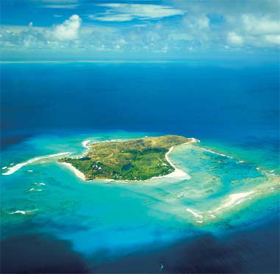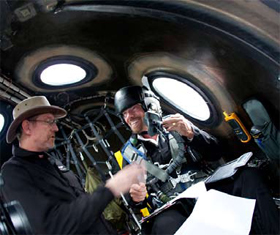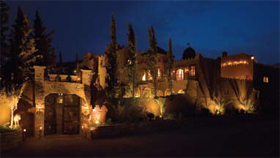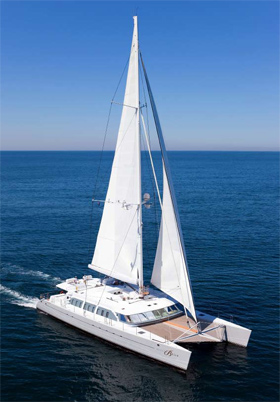|
Christopher Kanal catches up with Sir Richard Branson to discuss luxury, space travel and the future of capitalism and finds the Virgin boss in contemplative mood on his Caribbean island retreat of Necker.
Sir Richard Branson, the 59-year old billionaire
chairman of Virgin Group is as famous for his
record breaking attempts as he is for his business
and philanthropic activities. 2009 has been a big year for
Branson. His iconic airline Virgin Atlantic – the only
airline in the world to double profits last year – celebrated
its 25th anniversary. Virgin Galactic will unveil its first
spaceship, VSS Enterprise, in December.
Back on earth Branson has been busy with the Global
Elders, a forum of statesman, businessmen and peace
activists, including former US president Jimmy Carter and
Desmond Tutu, who are persuading politicians to do things
differently. He has also been increasing the number of
retreats for his Virgin Limited Edition brand – a collection
of luxury vacation properties, the first of which was his
own private island, Necker, in the Caribbean, from where
he talks to The Wealth Collection.
How did Virgin Limited Edition come about?
 I don’t like the idea of having a series of homes around
the world that lay empty when I’m not there. So what I
have done is create some really special homes that I share
with other people. The flagship home is Necker Island.
And I love Africa, so we ventured out to find a Necker
Island there and found Ulusaba private game reserve.
I don’t like the idea of having a series of homes around
the world that lay empty when I’m not there. So what I
have done is create some really special homes that I share
with other people. The flagship home is Necker Island.
And I love Africa, so we ventured out to find a Necker
Island there and found Ulusaba private game reserve.
A few years ago, when I was planning a ballooning trip
from Morocco, my parents found this lovely Kasbah in the
Atlas mountains where we added another spot, Kasbah
Tamadot. Because I love skiing we bought a retreat in
Verbier, Switzerland. Necker has 60 staff so I would hate the
extravagance of having 60 people looking after just us so we
share it with others.
Do you have a favourite Virgin Limited Edition property?
This Christmas we are going to Ulusaba and are taking a
bunch of friends with a lot of kids who have never seen
African wildlife. But I think my favourite has to be Necker
Island. I am very lucky. I have travelled all over the world
and I really do think it’s the most beautiful spot on earth.
We are trying to recreate Bali on a private island.
Where was the last place you travelled to that gave
you a really unique experience?
In my job I am very lucky that I get to travel
constantly. A recent trip that springs to mind is New
York - with Holly and Sam. This was a truly a unique
experience as it was the first time my children had
taken part in a record breaking attempt with me – our
attempt to be the fastest boat to sail across the Atlantic.
Sadly due to adverse weather condition we had to cut
short our adventure and head home. However I truly
enjoyed being in the middle of the Atlantic with a great
crew and my children – not sure my wife Joan enjoyed it
quite so much!
What does luxury mean to you?
Luxury is a personal concept. It can be as simple as having my
family and friends around me for a dinner at home.
Virgin Galactic is going into space. Are there any
places on planet earth that you still want to visit?
Bizarrely, I haven’t spent time in South America. I very,
very nearly went to the Grand Prix in São Paulo this
weekend and bitterly regretting not being there. I’m really
looking forward to exploring South America some time. I
think I have explored everywhere else in the world from
the Arctic to Antarctic.
How is Virgin Galactic going?
 Like a rocket – thank you! My team at Virgin Galactic,
alongside Burt Rutan and his amazing team at Scaled
Composites, will later this year unveil SpaceShip2, and she’ll
absolutely take your breath away. The Mothership Eve has
already undertaken many successful tests flights this year and
my heart swells with pride every time I see her in flight. I
cannot wait for the inaugural flight in a couple of years, and to
share this experience with my wonderful family.
Like a rocket – thank you! My team at Virgin Galactic,
alongside Burt Rutan and his amazing team at Scaled
Composites, will later this year unveil SpaceShip2, and she’ll
absolutely take your breath away. The Mothership Eve has
already undertaken many successful tests flights this year and
my heart swells with pride every time I see her in flight. I
cannot wait for the inaugural flight in a couple of years, and to
share this experience with my wonderful family.
In the midst of the financial crisis how can capitalism
get a good name again?
I don’t think capitalism per se has been damaged. I think
the banking sector has been damaged. I think, generally,
people accept that capitalism is the only system that works.
It certainly has its faults – one of which is extreme wealth
going to too few people.
So if you are one of those fortunate
people that benefitted from capitalism you should use your
wealth constructively by employing more people or creating
more businesses or tackling some of the seemingly intractable
problems in the world, and not leaving your wealth sitting in
a bank account. I think the important thing is that the people
who benefit from capitalism must use their good fortune to
make a difference. Spending millions on a private house is the
kind of thing that gives capitalism a bad name.
Virgin is known for taking risks. Should world leaders
take more risks, whether it be tackling environmental
or economic problems?
We created the Virgin Earth Challenge with a prize of $25
million to try to get people to come up with a solution.
Since we put up the prize, I feel very strongly that there is
a real chance that this may well be the ultimate answer to
tacking global warming and that a lot more resources should
be looking into seeing if there is an engineering answer
to the problems.
One of the ideas coming to us is biochar,
which turns waste products into charcoal, which you can
then bury. You can bury tons of carbon for centuries.
I think some people are thinking big. Obviously Bill
Gates is using his resources to think big and come up with
solutions. His inoculations for diseases have been going on
for years.
What would you like to come out of the COP15 United Nations
Climate Change Conference in Copenhagen in December? Do you
think a deal will be done?
I think a deal will be done. Whether it will go far enough, who knows. I think
one of the problems is the amount of scepticism in the US despite having a
president who believes a deal has to be done, and I think politically the will of
the people is such that they want to see a deal done there.
What are your thoughts on President Obama’s first year in office? Do
you think he has lived up to expectations?
I think Obama is the best president America has ever had. And he is now
obviously having to effectively roll up his sleeves and run the business and there
are difficulties running any business, let alone a country the size of America
and also the problems of the world. I think we are extremely fortunate to have
somebody of his capabilities in the White House. He’s morally correct in his
approach to what needs to be done and I think that plays a big part.
|
|
With healthcare it was immoral for a country with that kind of wealth to
allow 50 million people to go uncovered so he is bravely trying to push things
through. But obviously with the way that America works there has to be a lot
of give and take and compromise and that is something he has to deal with.
You set up the Carbon War Room and the Elders. Are you
considering a future political role?
I’m not interested in being involved in party politics. I’m very happy to talk and
speak out about issues through the Elders but I take a back seat. Through the
Elders, currently chaired by Desmond Tutu, I am involved indirectly in looking
at issues around the world. If you have conflicts in the world, nothing works,
education falls apart and health falls apart. In this day and age there should
not be the need for conflict. The Elders are in a position of moral authority
and respect and play a key role there. They have done a good job in their first
couple of years.
Virgin has a long history of being environmentally proactive but
how receptive are you finding your peer group to confronting
environmental issues?
There are good companies and there are quite a few companies that do very
little. I’m a slightly strange business person in that I never saw myself as a
business person. I just started off in the 1960s as somebody who wanted to
create a magazine and use the magazine to help campaign against the Vietnam
War. And then the business side came about in order to pay the bills for the
magazine and ever since then I have created things often out of frustration.
Virgin Atlantic was created because I hated the experience of flying other
people’s airlines and wanted to create the kind of airline I could be proud of
flying on. The business aspect was a necessity again to have to pay the bills.
It wasn’t something that I was particularly interested in – I’ve never been
particularly interested in making money – so what I find most interesting in life
is that I am now in the position where I can make real changes.
I’m sitting in my hammock as we talk and looking out over the
Caribbean. It’s a good place to think. Gordon Brown recently said that
global warming was a bigger threat than World War I and II put together.
In World War II, Winston Churchill had a war room. If you have a threat as
big as global warming, you should be pulling all forces together to tackle
the enemy – the enemy being carbon. And so it seemed obvious that this
problem needed a war room to co-ordinate the attack and see if we can
come up with off-the wall ideas, which again in a war you often have to do
in order to beat the enemy.
How has your work and social philosophy evolved since you started
or have your core beliefs remained the same?
 I think my philosophy has remained pretty much the same. It’s just that now
I have a higher public profile and more resources. I suppose I’m a lad of the
1960s, which was a slightly more caring generation with perhaps a lot more
understanding of minority groups than previous generations. I don’t think my
general philosophy has changed. I have obviously got a lot more time to look at
environmental issues or conflict issues.
I think my philosophy has remained pretty much the same. It’s just that now
I have a higher public profile and more resources. I suppose I’m a lad of the
1960s, which was a slightly more caring generation with perhaps a lot more
understanding of minority groups than previous generations. I don’t think my
general philosophy has changed. I have obviously got a lot more time to look at
environmental issues or conflict issues.
Who do you listen to for advice?
My dad Ted. Obviously it’s a privilege to sit with the Elders and spend
a few days with them every three months. We have just come back from Israel
and Palestine with a group of the Elders and that was absolutely fascinating.
Each one of the elders has learnt an enormous amount from one another.
Do you feel like a one man brand?
Never! I consider myself extremely lucky to share the Virgin brand with 50,000
employees who have helped shape and make us what we are today.
How do you balance your many business interests?
By not being afraid to ask for help. Over the years I have surrounded myself
with outstanding people who have helped to develop the various Virgin
businesses and grow them in to the success they are today. Virgin is not a
dictatorship – it never has been – it is full of amazing entrepreneurs who like
nothing better than getting out there and seeing a new business or product
grow. It’s not a case of balancing – it’s a case of trying to keep up with them!
Do you ever have an average day?
I think I’m very lucky. My days are full of variety and that’s what makes them
interesting. A bit like your job. I started off as a journalist and found that time
absolutely fascinating. You’re constantly learning about different things, which
also applies to what I do.
How do you relax?
 I am very lucky as my office is based on wonderful Necker Island; I can often
be found lying in my hammock with my blackberry and phone working away.
It’s one of my favourite places to relax and gather my thoughts. It’s a hard life!
I am very lucky as my office is based on wonderful Necker Island; I can often
be found lying in my hammock with my blackberry and phone working away.
It’s one of my favourite places to relax and gather my thoughts. It’s a hard life!
And do you feel as you get older you are more receptive and
learning more as you are open to new ideas?
I hope I’ve always been reasonably open. I was brought up by my parents
to be a good listener and not to impose my thoughts on other people too quickly. Hopefully I will continue to become an even better listener
as time to look at environmental and conflict issues.
What would you like your legacy to be?
To have created one of the most respected companies in the world. Also,
through our foundation Virgin Unite, to have encouraged and inspired
people to believe that they can make a real difference – all they need is
the confidence to get out there and give it a go.
Who has most inspired you?
I have been very, very lucky and met some truly inspirational men
and woman over the years. The late Freddie Laker was an extremely
inspirational figure I met in my early years – I was thinking about setting
up my own airline when we first met and he said: “You'll never have the
advertising power to outsell British Airways. You are going to have to get
out there and use yourself. Make a fool of yourself. Otherwise you won't
survive.” I have been following his advice to the letter ever since. Also
Nelson Mandela, Al Gore, Archbishop Tutu, Mary Robinson to name
but a few – men and women with truly good hearts who are not afraid
to say what they believe and raise the voices of people across the world
who would otherwise go unheard.
What’s the best piece of advice you’ve been given?
My mother always taught me never to look back in regret but to move
on to the next thing. The amount of time people waste dwelling on
failures rather than putting that energy into another project always
amazes me. A setback is never a bad experience, just a learning curve.
My dad also gave me some great advice and led by example – anger
is a pointless emotion. We should all try and remember that. When
people make mistakes and get things wrong they generally know that
and punish themselves for it. There’s little point in making it worse by
getting angry with them.
|







 I don’t like the idea of having a series of homes around
the world that lay empty when I’m not there. So what I
have done is create some really special homes that I share
with other people. The flagship home is Necker Island.
And I love Africa, so we ventured out to find a Necker
Island there and found Ulusaba private game reserve.
I don’t like the idea of having a series of homes around
the world that lay empty when I’m not there. So what I
have done is create some really special homes that I share
with other people. The flagship home is Necker Island.
And I love Africa, so we ventured out to find a Necker
Island there and found Ulusaba private game reserve. Like a rocket – thank you! My team at Virgin Galactic,
alongside Burt Rutan and his amazing team at Scaled
Composites, will later this year unveil SpaceShip2, and she’ll
absolutely take your breath away. The Mothership Eve has
already undertaken many successful tests flights this year and
my heart swells with pride every time I see her in flight. I
cannot wait for the inaugural flight in a couple of years, and to
share this experience with my wonderful family.
Like a rocket – thank you! My team at Virgin Galactic,
alongside Burt Rutan and his amazing team at Scaled
Composites, will later this year unveil SpaceShip2, and she’ll
absolutely take your breath away. The Mothership Eve has
already undertaken many successful tests flights this year and
my heart swells with pride every time I see her in flight. I
cannot wait for the inaugural flight in a couple of years, and to
share this experience with my wonderful family. I think my philosophy has remained pretty much the same. It’s just that now
I have a higher public profile and more resources. I suppose I’m a lad of the
1960s, which was a slightly more caring generation with perhaps a lot more
understanding of minority groups than previous generations. I don’t think my
general philosophy has changed. I have obviously got a lot more time to look at
environmental issues or conflict issues.
I think my philosophy has remained pretty much the same. It’s just that now
I have a higher public profile and more resources. I suppose I’m a lad of the
1960s, which was a slightly more caring generation with perhaps a lot more
understanding of minority groups than previous generations. I don’t think my
general philosophy has changed. I have obviously got a lot more time to look at
environmental issues or conflict issues. I am very lucky as my office is based on wonderful Necker Island; I can often
be found lying in my hammock with my blackberry and phone working away.
It’s one of my favourite places to relax and gather my thoughts. It’s a hard life!
I am very lucky as my office is based on wonderful Necker Island; I can often
be found lying in my hammock with my blackberry and phone working away.
It’s one of my favourite places to relax and gather my thoughts. It’s a hard life!